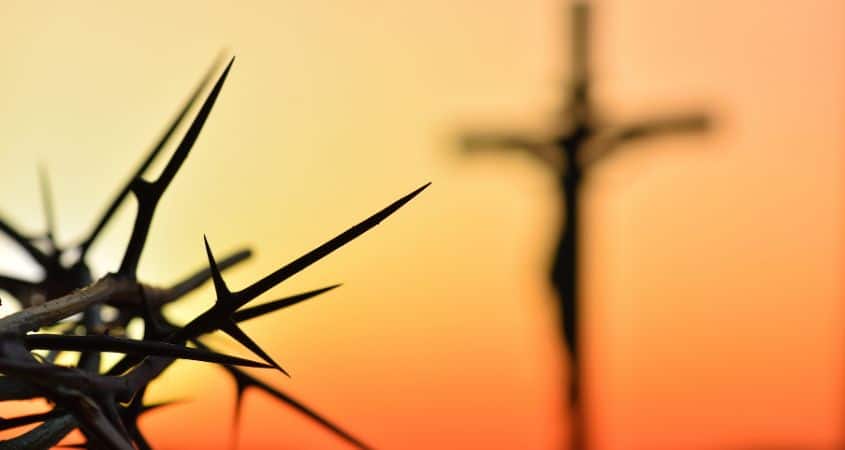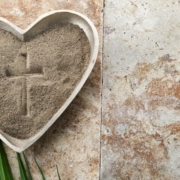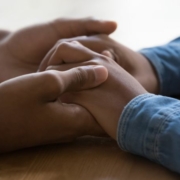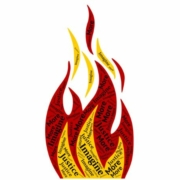Good Friday: Beyond Condemnation
BY MAKA BLACK ELK | April 7, 2023
Today’s Readings
“Do you not speak to me?
Do you not know that I have power to release you
and I have power to crucify you?”
John 19:10
Christ is asked this by Pontius Pilate, as Good Friday reminds us each year, in commemorating his passion and crucifixion. It is a power that, in many ways, we all have. The power to release and the power to condemn. In the case of Jesus Christ, that power that Pilate had ultimately gave way to his death.
The power to condemn and proverbially crucify has recently become politically and socially ubiquitous, as either a real or imagined crisis of our human discourse.

In my work as director of the Truth and Healing initiative at Maȟpíya Lúta | Red Cloud, I am witness to much of this challenging dynamic we face. The Catholic Church in the Americas has an easily condemnable history in its relationship with Indigenous peoples. I face that anger in the work I do, leading a former Indian boarding school in addressing its history and coming to terms with the pain and complexity of it all.
Condemnation has powerful and important purposes, it serves as an important beginning in the work of achieving greater justice for the innocent, oppressed, and marginalized. However, condemnation alone is not enough. We can also feel and appreciate how it is used to malign and impugn. In the depths of anger at injustice, it is challenging to see a way forward.
I was sitting in the depths of a profoundly difficult gathering a few years ago, hearing the outcries of angry activists we had gathered to listen to about our Truth and Healing efforts and our history. After hours of painful struggle, one of the protesters, an elder man in our community, said something I’ll never forget. In a heartfelt appeal to his fellow activists, he said, “We came here to fight against this Church. Instead, we are being listened to. Sometimes we need to trust.”
“Jesus answered [him],
‘You would have no power over me
if it had not been given to you from above.’”
John 19:11
It is easy to condemn. It is much more difficult to repent, forgive, trust, atone, and reconcile. Christ demonstrated this greatest of acts in his sacrifice for us as he committed his spirit into his Father’s hands. Amidst the greatest chaos there was God. Forgiving. Trusting.
I look to Christ and I look to that elder and know that God shows us the way beyond condemnation into beautiful relationships and healing.
For Reflection:
- While condemnation of injustices is a start, it is not the final word. How can you move beyond mere condemnation to work toward true and full reconciliation?
- How do you cope with the anger, pain, and complexity of injustices in need of healing?
Maka Black Elk is the executive director for Truth and Healing at Red Cloud Indian School. He graduated from Red Cloud in 2005 and returned as a teacher and later as an administrator in 2013 before taking on his current role.









I am blessed to work with many children who have been abused. They are easy to love. My anger at the Church leadership’s role and response to the sexual abuse crisis feels infinite- I pray, I cry, I study, I speak, I listen. Why, O Lord, have you abandoned us?
Dear Theresa,
I can identify with the gamut of your emotions regarding the Church’s lack of leadership in the past in the relationship with Indigenous peoples …especially in Canada. WE who have a voice need to use it to teach the TRUTH of our Canadian history regarding the Indigenous people. Teaching that TRUTH in such a way that is engaging and touches the heart is so important. When one can experience what it was and is like for Indigenous children and women and girls, one can be moved to a conversion of heart and take action.
Thank you for reminding us that listening is one of the most powerful forces of love.
Very nicely said. Gentle words, challenging reminder to do the hard work of forgiving instead of the easy work of shame and blame.
I struggle in being one with other Catholics in a church which still reflects racism and injustices in responses to the “other.” However, more and more I realize that although I can work and pray for changes in our church and our county which may or may not occur in my lifetime, I also can address my own attitudes in ways that reset my relationship and interactions with those with whom I disagree. Thanks to the grace of God, I am able to experience greater peace and hope in response to those things and values which separate us by trying to love all as God loves us.
“The weak can never forgive. Forgiveness is the attribute of the strong” – Mahatma Gandhi
It’s very difficult. The weight of the damage done & the persisting effects of the colonizers on my Native ancestors has been weighing so greatly on me.
When I see the anxiety my mom has & the self-hate my nieces & nephews internalize, my anger rises.
The racism is something that’s always surrounded us. It’s an infection. I grew up in a traumatized community. They didn’t even realize it, but it’s still there.
With recent political rhetoric & increase in normalizing racism & shutting down the pain of BIPOC, my pain & sadness has increased.
I’m not going great handling it truth being told.
I pray & I rely on God’s love & I try to get others to see it & try besides my best logical judgment to hold on to hope.
I try & focus on the growth done have made. It may be quieter , but it’s there. Organizations like ISN make all the difference in comforting me & helping my anger & pain lessen. Knowing work is being done & many to see it & care too means the world.
I cannot change others. I can only change myself and encourage others to do so, by sharing our stories not only of pain and abuse, but more importantly of how we are healing ourselves despite what happened. We have survived and triumphed.
That alone gives others courage and maybe even shines a flicker of light for perpetrators to also change from inflicting harm on others to being compassionate and understanding towards them after having addressed their own abuse issues.